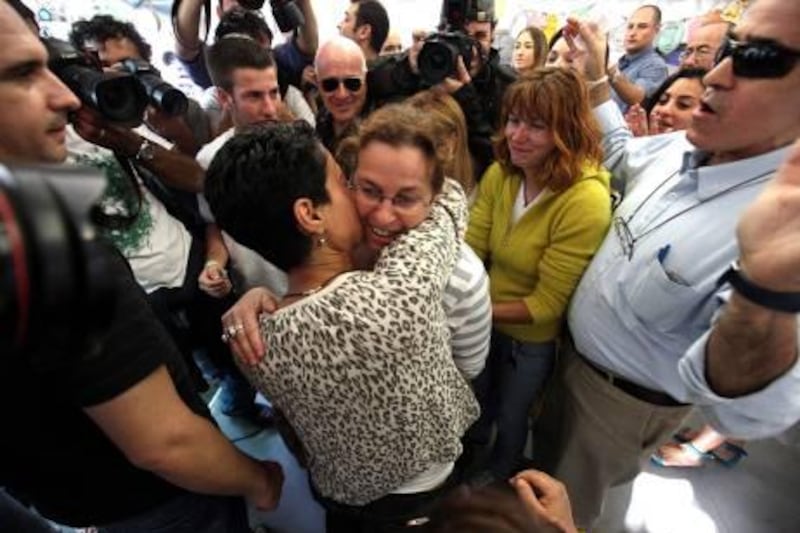TEL AVIV // Hamas and the Israeli government of prime minister Benjamin Netanyahu are both likely to score political points from the deal to swap 1,027 Palestinian detainees for a captured Israeli soldier.
Under the pact brokered by Egyptian and German mediators after five years of fruitless talks, Israel will free the detainees in exchange for Gilad Shalit, the 25-year-old soldier seized by Gaza militants during an attack on an Israeli army post on the Gaza border in 2006.
The exchange may start as early as next week, with Mr Shalit being swapped for about 450 detainees. The remaining prisoners are expected to be freed two months later.
Commentators said yesterday that Hamas is likely to win support from Palestinians at the expense of the Palestinian Authority and Fatah, its longtime rivals. The Islamist movement that rules the Gaza Strip yesterday hailed the accord as a "national victory".
At the same time, the deal may bring political gains for Mr Netanyahu after his cabinet approved it in a 26-3 vote.
Mr Shalit has become a household name for most Israelis, and his return home could help the prime minister to regain some of the support he has lost amid months of mass protests over the cost of living.
Egypt's military rulers, also facing a loss of support over their handling of Sunday's protests by Coptic Christians and what some Egyptians see as their attempts to stall the transition to a democratically elected civilian government, may also benefit from the diplomatic breakthrough.
For Mr Netanyahu and Hamas, however, the boost in public opinion polls may be limited by criticism of the agreement from within their own ranks.
Commentators said Mr Netanyahu may have alienated many on the right who helped to bring him to power in 2009 and who have resisted the release of Palestinian prisoners convicted of killing Israelis. About 300 of the detainees to be swapped are serving life sentences for violent attacks against Israelis.
Uzi Landau, a government minister from the ultranationalist Yisrael Beitenu party who had opposed the deal, described it yesterday as a "major victory to terror" and cautioned that the released Palestinians may launch attacks against Israelis.
Hamas may also draw condemnation for what some analysts said was backing down on key negotiating positions. High-profile prisoners whose release had been demanded will remain in jail, and some of those freed will be sent into exile abroad rather than be permitted to return to their homes in the West Bank and Gaza Strip.
Prominent detainees who will not be released include Marwan Barghouti, a charismatic leader in the Fatah party who is widely viewed by Palestinians as having led the second intifada that started in 2000.
Mr Barghouti is serving five life sentences after being convicted in an Israeli court of involvement in the killing of four Israelis and a Greek Orthodox monk in shooting attacks by Fatah militants.
Another well known detainess who will remain locked up is Ahmed Saadat, the leader of the Popular Front for the Liberation of Palestine, the faction held responsible for assassinating a right-wing Israeli government minister at a Jerusalem hotel in 2001.
Two other prominent Palestinian prisoners who will not be freed are Ibrahim Hamed, the head of Hamas's military operations in the West Bank who was convicted by an Israeli court for his involvement in several suicide bombings in Israeli cities, and Abdullah Barghouti, a Hamas bomb-maker jailed for killing 66 Israelis in several attacks.
Some Palestinians expressed worry that those freed from Israeli jails may quickly be detained again.
"We hope they will not be arrested again. That is the main point of concern," said Bassam Naim, a 34-year-old grocery shop worker in Ramallah.
Yesterday, Hamas was keen to play down criticism from its own ranks that the negotiation and compromise that led to the prisoner swap meant that the Islamist organisation was giving up armed resistance against the Jewish state.
Fawzi Barhoum, a spokesman in Gaza, suggested that Hamas, with its armed attacks on Israel, had achieved more for the Palestinians than years of negotiations by Fatah with Israel.
"The occupation can only respond to one thing, and that's a resistance that fights for the real Palestinian rights," he said.
Some analysts said the deal regained for Hamas some of the political credibility it had lost when Mahmoud Abbas, president of the Palestinian Authority and the chairman of Fatah, defied Israel, the US and other western powers by pursuing Palestinian statehood at the United Nations.
Mahdi Abdul-Hadi, founder of the Jerusalem-based Palestinian Academic Society for the Study of International Affairs, suggested that Washington may have lobbied hard for the prisoner swap to teach Mr Abbas a lesson.
"At the end of the day, who delivered? You saw the Egyptians delivering, Netanyahu delivering, Hamas delivering, and you saw Abbas sitting back and watching. Is this pressure from the Americans telling Abbas that, 'Hey, you can't act alone without us?'"
vbekker@thenational.ae
hnaylor@thenational.ae
Hamas and Netanyahu share spoils of swap deal
Agreement to swap Palestinian detainees for captured Israeli solider likely to bring political gains for both Hamas and Israeli government

Editor's picks
More from the national




